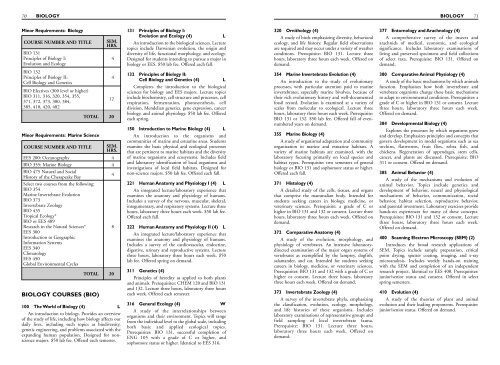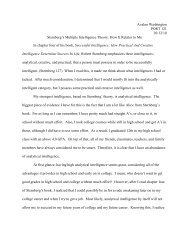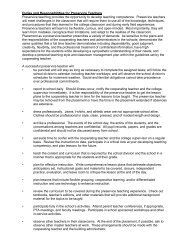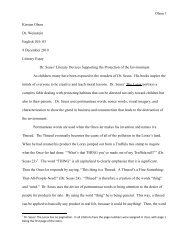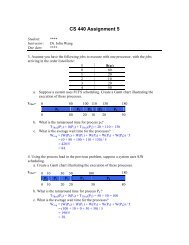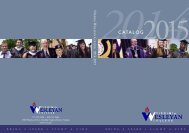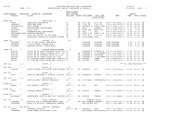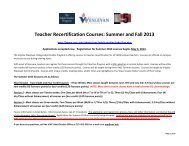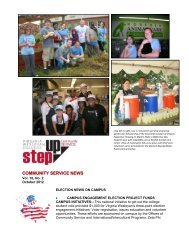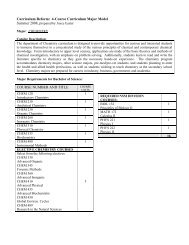2013-2014 Catalog - Virginia Wesleyan College
2013-2014 Catalog - Virginia Wesleyan College
2013-2014 Catalog - Virginia Wesleyan College
- No tags were found...
Create successful ePaper yourself
Turn your PDF publications into a flip-book with our unique Google optimized e-Paper software.
70 BIOLOGYBIOLOGY71Minor Requirements: BiologyCOURSE NUMBER AND TITLESEM.HRS.BIO 131Principles of Biology I: 4Evolution and EcologyBIO 132Principles of Biology II: 4Cell Biology and GeneticsBIO Electives (300 level or higher)BIO 311, 316, 320, 354, 355,12371, 372, 373, 380, 384,385, 410, 420, 482TOTAL 20Minor Requirements: Marine ScienceCOURSE NUMBER AND TITLESEM.HRS.EES 200: Oceanography 4BIO 355: Marine Biology 4BIO 475 Natural and Social4History of the Chesapeake BaySelect two courses from the following:BIO 354Marine Invertebrate EvolutionBIO 373Invertebrate ZoologyBIO 435Tropical Ecology*BIO or EES 489Research in the Natural Sciences* 8EES 300Introduction to GeographicInformation SystemsEES 340ClimatologyEES 450Global Environmental CyclesTOTAL 20BIOLOGY COURSES (BIO)100 The World of Biology (4) LAn introduction to biology. Provides an overviewof the study of life, including how biology affects ourdaily lives, including such topics as biodiversity,genetic engineering, and problems associated with theexpanding human population. Designed for nonsciencemajors. $50 lab fee. Offered each semester.131 Principles of Biology I:Evolution and Ecology (4)LAn introduction to the biological sciences. Lecturetopics include Darwinian evolution, the origin anddiversity of life, functional morphology, and ecology.Designed for students intending to pursue a major inbiology or EES. $50 lab fee. Offered each fall.132 Principles of Biology II:Cell Biology and Genetics (4)LCompletes the introduction to the biologicalsciences for biology and EES majors. Lecture topicsinclude biochemistry, cell structure and processes, cellrespiration, fermentation, photosynthesis, celldivision, Mendelian genetics, gene expression, cancerbiology, and animal physiology. $50 lab fee. Offeredeach spring.150 Introduction to Marine Biology (4) LAn introduction to the organisms andcommunities of marine and estuarine areas. Studentsexamine the basic physical and ecological processesthat are pertinent to marine habitats and the diversityof marine organisms and ecosystems. Includes fieldand laboratory identification of local organisms andinvestigations of local field habitats. Designed fornon-science majors. $50 lab fee. Offered each fall.221 Human Anatomy and Physiology I (4) LAn integrated lecture/laboratory experience thatexamines the anatomy and physiology of humans.Includes a survey of the nervous, muscular, skeletal,integumentary, and respiratory systems. Lecture threehours, laboratory three hours each week. $50 lab fee.Offered each fall.222 Human Anatomy and Physiology II (4) LAn integrated lecture/laboratory experience thatexamines the anatomy and physiology of humans.Includes a survey of the cardiovascular, endocrine,digestive, urinary and reproductive systems. Lecturethree hours, laboratory three hours each week. $50lab fee. Offered spring on demand.311 Genetics (4)Principles of heredity as applied to both plantsand animals. Prerequisites: CHEM 120 and BIO 131and 132. Lecture three hours, laboratory three hourseach week. Offered each semester.316 General Ecology (4) WA study of the interrelationships betweenorganisms and their environment. Topics will rangefrom the individual level to the global scale, includingboth basic and applied ecological topics.Prerequisites: BIO 131, successful completion ofENG 105 with a grade of C or higher, andsophomore status or higher. Identical to EES 316.320 Ornithology (4)A study of birds emphasizing diversity, behavioralecology, and life history. Regular field observationsare required and may occur under a variety of weatherconditions. Prerequisite: BIO 131. Lecture threehours, laboratory three hours each week. Offered ondemand.354 Marine Invertebrate Evolution (4)An introduction to the study of evolutionaryprocesses, with particular attention paid to marineinvertebrates, especially marine bivalves, because oftheir rich evolutionary history and well-documentedfossil record. Evolution is examined at a variety ofscales from molecular to ecological. Lecture threehours, laboratory three hours each week. Prerequisite:BIO 131 or 132. $50 lab fee. Offered fall of evennumberedyears on demand.355 Marine Biology (4)A study of organismal adaptation and communityorganization in marine and estuarine habitats. Avariety of marine habitats are examined, with thelaboratory focusing primarily on local species andhabitat types. Prerequisite: two semesters of generalbiology or BIO 131 and sophomore status or higher.Offered each fall.371 Histology (4)A detailed study of the cells, tissues, and organsthat comprise the mammalian body. Intended forstudents seeking careers in biology, medicine, orveterinary sciences. Prerequisite: a grade of C orhigher in BIO 131 and 132 or consent. Lecture threehours, laboratory three hours each week. Offered ondemand.372 Comparative Anatomy (4)A study of the evolution, morphology, andphysiology of vertebrates. An intensive laboratorydirectedexamination of the major organ systems ofvertebrates as exemplified by the lamprey, dogfish,salamander, and cat. Intended for students seekingcareers in biology, medicine, or veterinary sciences.Prerequisites: BIO 131 and 132 with a grade of C orhigher or consent. Lecture three hours, laboratorythree hours each week. Offered on demand.373 Invertebrate Zoology (4)A survey of the invertebrate phyla, emphasizingthe classification, evolution, ecology, morphology,and life histories of these organisms. Includeslaboratory examinations of representative groups andfield sampling of local invertebrate fauna.Prerequisite: BIO 131. Lecture three hours,laboratory three hours each week. Offered ondemand.377 Entomology and Arachnology (4)A comprehensive survey of the insects andarachnids of medical, economic, and ecologicalsignificance. Includes laboratory examinations ofliving and preserved specimens and field collectionsof select taxa. Prerequisite: BIO 131. Offered ondemand.380 Comparative Animal Physiology (4)A study of the basic mechanisms by which animalsfunction. Emphasizes how both invertebrate andvertebrate organisms change these basic mechanismsto adapt to environmental conditions. Prerequisites: agrade of C or higher in BIO 131 or consent. Lecturethree hours, laboratory three hours each week.Offered on demand.384 Developmental Biology (4)Explores the processes by which organisms growand develop. Emphasizes principles and concepts thatgovern development in model organisms such as seaurchins, flatworms, fruit flies, zebra fish, andchickens. Regeneration of appendages, stem cells,cancer, and plants are discussed. Prerequisite: BIO311 or consent. Offered on demand.385 Animal Behavior (4)A study of the mechanisms and evolution ofanimal behavior. Topics include genetics anddevelopment of behavior, neural and physiologicalmechanisms of behavior, communication, socialbehavior, habitat selection, reproductive behavior,and parental investment. Laboratory exercises providehands-on experiences for many of these concepts.Prerequisites: BIO 131 and 132 or consent. Lecturethree hours, laboratory three hours each week.Offered on demand.400 Scanning Electron Microscopy (SEM) (2)Introduces the broad research applications ofSEM. Topics include sample preparation, criticalpoint drying, sputter coating, imaging, and x-raymicroanalysis. Includes weekly hands-on trainingwith the SEM and completion of an independentresearch project. Identical to EES 400. Prerequisites:junior/senior status and consent. Offered in selectspring semesters.410 Evolution (4)A study of the theories of plant and animalevolution and their leading proponents. Prerequisite:junior/senior status. Offered on demand.


